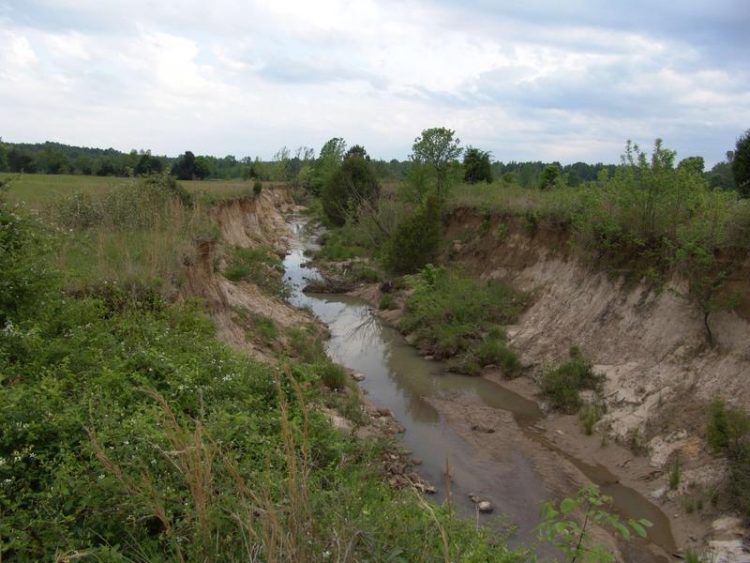Agricultural insecticide contamination threatens U.S. surface water integrity at the national scale

Degraded agricultural stream in the Mississippi delta. Ralf Schulz
Insecticides are applied in large volumes across the United States to protect agricultural crops from insect pests. As has been shown before through studies e.g. by the USGS or the U.S. EPA, these substances can be transported from agricultural fields into adjacent water bodies via various pathways where they have profound adverse effects on both water quality and biodiversity.
Therefore, insecticides have to pass an elaborated environmental risk assessment procedure before being sold and applied to crops. During this process, regulatory threshold concentrations are derived, which should not be surpassed, in order to prevent adverse effects in non-target environments such as surface waters.
These thresholds were compared to actual field concentrations of 32 commonly applied insecticides, obtained from 259 peer-reviewed publications reporting insecticide concentrations in more than 600 water bodies in the U.S.
In this extensive meta-analysis, about half of the total of 5817 measured insecticide concentrations exceeded these critical thresholds; more so, about one fourth of all concentrations surpassed these thresholds by a factor of ten or more.
Thus insecticides occur frequently at adverse concentrations and exceed levels that were expected during the pesticides’ approval process. In addition, risks were even more pronounced for smaller water bodies, which is especially concerning considering that they denote critical habitats for endangered species and serve as important spawning grounds for fish.
In particular newer insecticides, such as pyrethroids and neonicotinoids, were of particular concern, replacing older substances but thereby failing to provide a more environmentally safe alternative.
“One of our biggest concerns is that environmental risks did not decrease over time.”, added Jakob Wolfram. As a result, insecticides’ current use practices may not be in accordance with environmental protection goals, requiring a critical reassessment of their environmental risks.
In the future, insecticide application may even increase due to changing weather conditions and intensifying pressure from invasive pest species. Addressing this central challenge to surface water integrity appears thus more pressing than ever, if sustainable and safe use of water resources should be achieved in the United States.
University of Koblenz-Landau
Department of Environmental Sciences
Prof. Dr. Ralf Schulz
Fortstraße 7
D-76829 Landau
Phone: +49 6341 280-31327
Email: schulz@uni-landau.de
“Meta-Analysis of Insecticides in United States Surface Waters: Status and Future Implications” by Jakob Wolfram, Sebastian Stehle, Sascha Bub, Lara L. Petschick, Ralf Schulz. The study was published on November 26, 2018 in the journal Environmental Science & Technology.
Media Contact
More Information:
http://www.uni-koblenz-landau.deAll latest news from the category: Power and Electrical Engineering
This topic covers issues related to energy generation, conversion, transportation and consumption and how the industry is addressing the challenge of energy efficiency in general.
innovations-report provides in-depth and informative reports and articles on subjects ranging from wind energy, fuel cell technology, solar energy, geothermal energy, petroleum, gas, nuclear engineering, alternative energy and energy efficiency to fusion, hydrogen and superconductor technologies.
Newest articles

NASA: Mystery of life’s handedness deepens
The mystery of why life uses molecules with specific orientations has deepened with a NASA-funded discovery that RNA — a key molecule thought to have potentially held the instructions for…

What are the effects of historic lithium mining on water quality?
Study reveals low levels of common contaminants but high levels of other elements in waters associated with an abandoned lithium mine. Lithium ore and mining waste from a historic lithium…

Quantum-inspired design boosts efficiency of heat-to-electricity conversion
Rice engineers take unconventional route to improving thermophotovoltaic systems. Researchers at Rice University have found a new way to improve a key element of thermophotovoltaic (TPV) systems, which convert heat…



